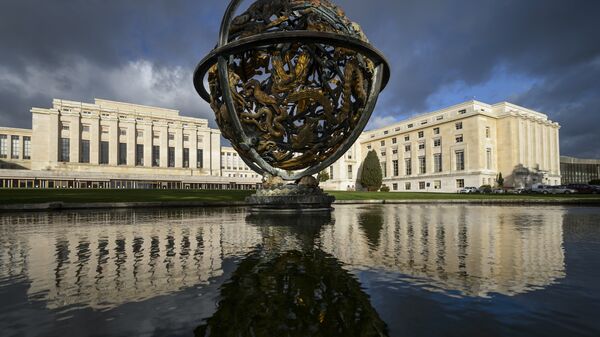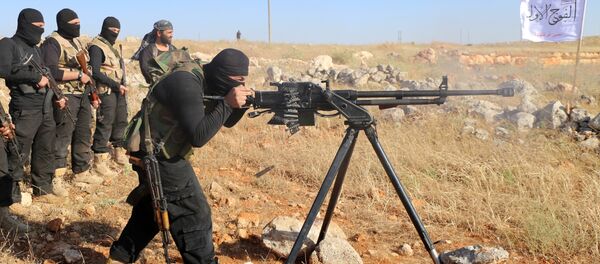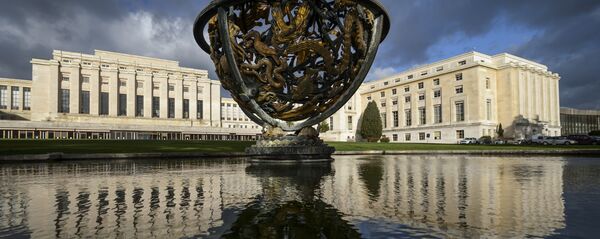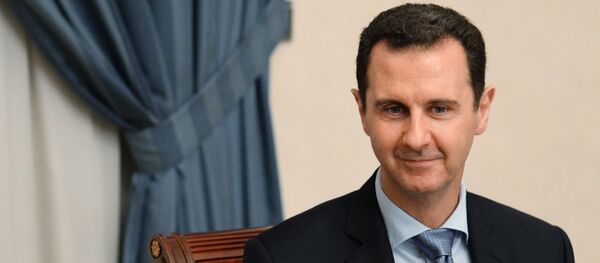GENEVA (Sputnik), Anastasia Levchenko – The April round of the indirect peace talks between the Syrian government and opposition groups in Geneva is now over, having seen no practical outcome, but plenty of drama from each of the participating sides.
HNC’s Failed Blackmail
The most memorable diplomatic maneuver at this round of talks was the departure of Riyadh-backed High Negotiations Committee (HNC), which failed to produce an effect the opposition delegation had in mind.
Since the beginning of the April round, all parties, including the HNC and the Damascus delegation headed by Ambassador Bashar Jaafari, expressed their intention to focus solely on a political transition in Syria. UN Special Envoy for Syria Staffan de Mistura also confirmed the intention to look at one track only and was waiting for written explanations from the sides of what a transitional process and a governing body mean for each of them.
On Tuesday, Hijab said that the HNC was suspending its participation until fighting in Syria ends, in protest over ceasefire violations by Damascus, lack of progress on humanitarian issues and the continuation of sieges in a number of areas.
The HNC delegation appeared to expect that the ongoing round of peace talks would be stalled, the discussion of real aspects of the political transition would be postponed indefinitely, as it is already more than five years that fighting in Syria is going on, and that the HNC would look as the only defender of Syrian people and peace in the country.
Nevertheless, the talks continued as scheduled.
HNC’s Internal Split
Other delegations – the Moscow-Cairo group, the internal opposition platform, or Hmeymim group, and the Damascus delegation grasped the window of opportunity to promote their agendas.
Even the UN Special Envoy, who always stays neutral in the tense talks, called the HNC move "an act of pressure" and continued meeting with those who were willing to meet with him.
Shortly after Hijab’s announcement, Sputnik learned from a source close to the HNC that the delegation had split over the issue of the necessity to continue the current round of intra-Syrian talks in Geneva. One wing, with delegation head Asaad al-Zoubi and chief negotiator Mohammed Alloush, insisted on the "uselessness of talks", while the other wing, with official representative Salem al-Meslet said the Geneva process is the only chance to move toward a settlement.
Although HNC representatives repeatedly denied the fact of the split, it became obvious when most of the delegates left Geneva, and a few stayed in the city for "technical meetings" with de Mistura.
Other Parties Seize the Moment
After the HNC walkout, other delegations who stayed in Geneva seized the moment to promote their views on the political transition.
Bashar Jaafari, echoing the words of Syrian President Bashar Assad and Prime Minister Wael Nader Halqi, called for the formation of "an expanded government" with the participation of representatives of the current government, opposition and independents.
Apparently, the idea of vice-presidents got a positive response from de Mistura.
The HNC, however, rules out both proposals, saying that Assad must go, and it is the "red line."
Preparing for Next Round
At the final press conference, de Mistura presented a document summarizing common points in the positions of all the parties to the talks.
So far, the parties have agreed that the need for a political transition in Syria is urgent, that the transitional governing body should be inclusive and should bring together members of the current government, opposition and independents, and Syria needs a new constitution that should be endorsed by a popular referendum.
De Mistura also set out a list of fundamental issues that need to be addressed during intra-Syrian talks in order to ensure a viable political transitional in Syria. They include the identification of "the most appropriate schedule and process for drafting the new constitution," as well as the "delineation of a clear and agreed timetable and set of benchmarks for the transition."
Prior to the next round, the International Syria Support Group (ISSG) should convene at the ministerial level to reinforce the cessation of hostilities on the ground. De Mistura said that Russia and the United States should take the initiative again to re-launch the ceasefire deal.
The next round of talks is expected "in [the] course of May," as the Special Envoy put it. The exact date would depend on the situation with the cessation of hostilities on the ground.





